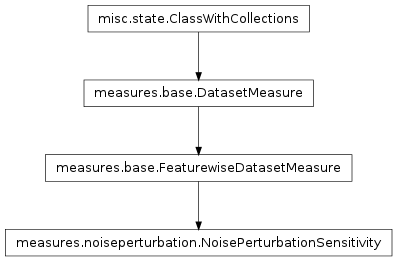 |
Multivariate Pattern Analysis in Python |
 |
Multivariate Pattern Analysis in Python |
Inheritance diagram for mvpa.measures.noiseperturbation:

This is a FeaturewiseDatasetMeasure that uses a scalar DatasetMeasure and selective noise perturbation to compute a sensitivity map.
Bases: mvpa.measures.base.FeaturewiseDatasetMeasure
This is a FeaturewiseDatasetMeasure that uses a scalar DatasetMeasure and selective noise perturbation to compute a sensitivity map.
First the scalar DatasetMeasure computed using the original dataset. Next the data measure is computed multiple times each with a single feature in the dataset perturbed by noise. The resulting difference in the scalar DatasetMeasure is used as the sensitivity for the respective perturbed feature. Large differences are treated as an indicator of a feature having great impact on the scalar DatasetMeasure.
The computed sensitivity map might have positive and negative values!
Note
Available state variables:
(States enabled by default are listed with +)
See also
Please refer to the documentation of the base class for more information:
Cheap initialization.
| Parameters: |
|
|---|